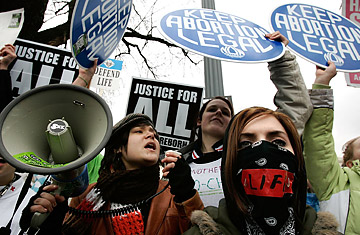
A pro-life activist, right, stands silently amid pro-choice demonstrators outside the U.S. Supreme Court
The volume in the abortion debate has been stuck at rancorous screaming for so long that when it gets turned down, it's disorienting, like walking outside after a rock concert and trying to hear again. So the significance may not immediately register when two House Democrats introduce legislation on July 23 aimed at reducing abortion rates. But regardless of whether their bill succeeds or fails, the broad array of supporters behind it represents a dramatic break from nearly four decades of post-Roe politics.
If that sounds like hyperbole, consider this: just three years ago, when the two Representatives, pro-life Tim Ryan of Ohio and pro-choice Rosa DeLauro of Connecticut, introduced an earlier version of the legislation, they could persuade only one religious organization — and not a single abortion-rights group — to support them. Today leaders from Planned Parenthood and NARAL will be crowded elbow to elbow with Catholics and conservative Evangelicals to stand behind Ryan and DeLauro. It may not be an end to the culture war, but it looks a lot like a cease-fire.
You wouldn't know from looking at the bill that it took four years of negotiation and accommodation to produce this version. Aside from its support for contraception, none of the new or expanded initiatives it contains are terribly controversial: a national campaign to teach parents how to talk to their kids about sex, efforts to educate the public about adoption, home nurse visits for low-income mothers, expanded postpartum Medicaid coverage.
Interestingly, the arduous work of getting traditional adversaries on the abortion issue to endorse the Ryan-DeLauro effort had relatively little to do with concerns about the substance of specific provisions. Instead, the bill's backers found they needed to give people on both sides time to learn to let down their guard a little after decades of skirmishes. "We had to reach a level of trust," says DeLauro. "Because so often this issue has been one about which there was nothing other than trying to score political points."
One way to encourage trust was to make changes that Rachel Laser, director of the culture program of the think tank Third Way, says were designed to "turn down the heat." Laser began her career in the pro-choice community and agreed four years ago to help Ryan craft a common-ground bill. She shouldered the task of patiently hearing out each group's concerns and turning them into a final product that could garner broad support without being uselessly watered down or split into two. When abortion-rights advocates, for example, objected to a provision to have abortion providers obtain what is called "informed consent" from patients (a requirement already mandated in all 50 states), Laser removed it. And she did the same when some of the bill's pro-life supporters complained that a section requiring homes for pregnant women to provide family-planning counseling would take funding away from Catholic group homes that don't support contraception.
The legwork paid off in the form of a final bill that is hard to oppose. A truism of Washington politics is that everybody talks about common ground but nobody likes it — at least, until they're in danger of being the only ones standing in the way. The process also inspired some participants to respond in good faith; several Catholic endorsers who do not support contraception did not let that stop them from giving their full backing to the bill. President Barack Obama provided an additional boost in his commencement speech at the University of Notre Dame, in which he urged groups to come together to reduce the number of abortions. "This Administration has lowered the provocation levels," says Joel Hunter, a pro-life Evangelical who supports the Ryan-DeLauro bill. "That's allowed all of those who have traditionally focused on just one part of the agenda to begin to mature in the way we approach politics and take a chance on working with each other."
Of course, this is abortion politics, so there are still speed bumps ahead. The most immediate is the roiling fight over whether to include coverage for abortion services in health-care reform. Ryan is trying to broker a deal for pro-life Democrats that would basically codify the status quo, in which private insurers are neither required nor prevented from offering abortion services and no federal funding is involved. More than anything, the fight risks aggravating old wounds that could end these newly formed — and still tentative — partnerships and send the bill's many supporters into adversarial camps again.
Suspicions continue to fester. Frances Kissling, a liberal Catholic and an abortion-rights advocate, declared her "unqualified" support for the Ryan-DeLauro bill earlier this week and promptly launched a broadside at pro-life supporters of the effort in an essay on Salon. "While the new anti-abortionists do not use the same words as their older counterparts," Kissling wrote, "they are thinking the same thoughts."
For their part, pro-life activists are likely to look at the list of Ryan-DeLauro supporters and see no marquee names from their movement, despite the fact that a variety of conservative pro-life religious leaders have endorsed the initiative. They could also object to the legislation's cost — which has not yet been estimated — but it may be difficult for them to argue that the price of reducing abortions is too high.
Obama has directed his staff to develop their own plan for tackling abortion reduction, and he is reportedly aiming to make an announcement about those efforts in August. The White House has conducted meetings with a broad array of pro-life and pro-choice advocates. But getting opponents to sit down and talk about abortion is only the first step. So instead of reinventing the wheel, Obama should use the newly introduced House bill as the model, DeLauro says, adding, "We've already done all the work here!"
